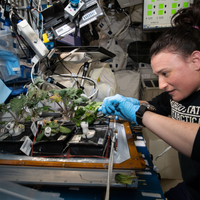diet

Study Links Depression with High Levels of an Amino Acid
Dan Robitzski | Jun 14, 2022 | 5 min read
Experiments in animals and observations in humans suggest that the amount of proline circulating in one’s plasma has a strong association with depression severity.

Surface Area of Tooth Roots Predicts Primate Body Size
Maddie Bender | May 2, 2022 | 2 min read
Researchers determine that a primate’s tooth root, and not just its crown, can yield reliable information about body size, but the relationship between root surface area and diet isn’t as clear.

“Father of Preventive Cardiology” Jeremiah Stamler Dies at 102
Lisa Winter | Feb 18, 2022 | 3 min read
He was among the first to identify lifestyle factors that contribute to cardiovascular disease.

Bacteria-Infecting Viruses in Gut Microbiome Linked to Cognition
Dan Robitzski | Feb 16, 2022 | 5 min read
Research in mice and flies suggests that bacteriophages, including those found in dairy foods, may have an influence on an animals’ ability to learn and remember information.

Genetically Altered Mice Harness Benefits of Calorie Restriction
Sophie Fessl, PhD | Feb 11, 2022 | 4 min read
A study identifies a gene that appears to be partially responsible for the health effects of a limited diet.

Mummified Gut Bugs Reveal Ancient Dietary Secrets
Iris Kulbatski, PhD | Jan 10, 2022 | 5 min read
Reconstructing the diet and microbiome of human ancestors shows an astonishingly rapid loss of microbiome diversity.

Diet Implicated in Autism-Microbiome Link
Ruth Williams | Nov 11, 2021 | 3 min read
The unbalanced gut flora present in some people with autism is not a driver of the condition but rather a consequence of eating behaviors characteristic of the condition, a new study claims.

Public Health Pioneer Peter Pharoah Dies at 87
Dan Robitzski | Nov 11, 2021 | 2 min read
Pharoah’s work ended endemic cretinism in a remote region of Papua New Guinea and contributed to the understanding of myriad other perinatal health conditions.

Salty Diet Helps Gut Bugs Fight Cancer in Mice: Study
Sophie Fessl, PhD | Sep 20, 2021 | 4 min read
A high-salt diet suppressed the growth of tumors in a mouse model of melanoma, apparently because of an interplay between the gut microbiome and natural killer cells.

Umami Taste Receptor Evolved with Primates’ Diets
Abby Olena, PhD | Sep 6, 2021 | 4 min read
A study suggests that mutations in the gene that encodes the T1R1/T1R3 taste receptor allowed primates that relied on insects for protein to transition to eating leaves and fruit.

Could a Synthetic Probiotic Replace a Strict Diet for Patients with Phenylketonuria?
Roni Dengler, PhD | Aug 16, 2021 | 2 min read
Synthetic biologists introduced an engineered microbe that may lead to new treatment options for phenylketonuria.

Tiny Hitchhikers Reveal Turtles’ Movements and Foraging Ecology
Amanda Heidt | Jul 13, 2021 | 7 min read
Microscopic creatures called epibionts that live on sea turtles’ shells can help researchers understand their secretive lives.

Vitamin D Deficiency Drives Opioid Addiction in Mice
Amanda Heidt | Jun 16, 2021 | 5 min read
Mice with low vitamin D had exaggerated craving for opioids and felt the drugs’ effects more strongly—results supported in part by human medical records—suggesting that supplements should be explored as treatments for opioid use disorders.

Dietary Spermidine Boosts Cognition in Insects and Rodents
Ruth Williams | Apr 15, 2021 | 3 min read
Mice and flies given the polyamine in their diet have increased brain cell metabolism and cognitive function, and epidemiological data hints at a similar benefit in humans.

Mysterious Immune Cells Change the Gut Lining to Accommodate Diet
Annie Melchor | Apr 6, 2021 | 4 min read
A study shows gamma-delta T cells in mice respond to shifts in nutrients by changing the cellular composition of the intestinal epithelium.

Nutrition Researchers Can Determine What You’ve Been Eating
Amber Dance | Dec 1, 2020 | 10+ min read
The study of diet, long plagued by inaccuracies in self reports, is entering a new age of precision with the methods of metabolomics.

Infographic: Deciphering Diet from Blood and Urine Samples
Amber Dance | Dec 1, 2020 | 1 min read
Nutrition researchers are beginning to use metabolomics to determine how healthy subjects’ diets are, and even to reveal specific properties of the foods they eat.

Space-Grown Lettuce Is Safe and Astronaut-Approved
Amy Schleunes | Mar 9, 2020 | 2 min read
NASA’s vegetable production system, known as Veggie, may help pave the way for more sophisticated systems that could supplement astronauts’ diets during long trips to space.

Image of the Day: Poison Tolerance
Emily Makowski | Oct 3, 2019 | 1 min read
Genetically engineered Drosophila withstand toxins common in monarch butterflies’ diet.

There’s a Troubling Rise in Colorectal Cancer Among Young Adults
Katarina Zimmer | Aug 26, 2019 | 7 min read
Some experts blame our modern, sugary diet, while others think that gut microbiome changes and sedentary lifestyles may play a role. Altogether, the causes are far from clear.
